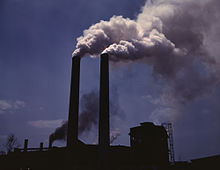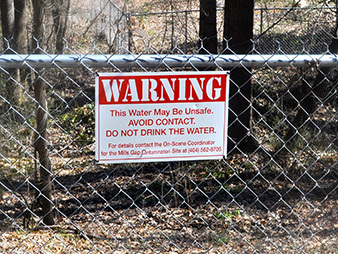George Kennan and the Environment: With Friends Like These…
One Cannot Divorce His Environmentalism From His Racism
Last year, I read John Lewis Gaddis' magisterial biography of George F. Kennan, one of the prime architects of American Cold War policy and a distinguished foreign policy intellectual. I was surprised -- and not a little pleased -- to learn from that book that Kennan was something of a pioneering environmentalist, thinking about these issues long before it became fashionable. As early as 1954, in his book Realities of American Foreign Policy, Kennan argued: [The] ...
CONTINUE READINGThe Quest to Tame the River
"Mississippi River Tragedies" tells the story of the river's refusal to stay within the walls that we build.
As the song tells us, “Old Man River, he just keeps rolling along” – but he doesn’t necessarily roll where we want him to. Human efforts at controlling the river and its massive tributaries succeed at times but seem always doomed to eventual failure. We are playing defense against an opponent that is infinitely patient, needing only to find the right time and place to overcome or sidestep our efforts and knock us flat. Mississippi River Tragedies, by Chris...
CONTINUE READINGFracking and the Environment
A new RFF report sheds light on the critical issues.
There are a lot of unanswered questions about natural gas and fracking. A recent report by Resources for the Future sheds light on some of the answers. RFF is unusual among Washington think tanks -- an honest broker that uses expertise to try to answer hard questions. The report reaches three important conclusions. The first conclusion relates to impacts on water. In terms of water pollution, the report finds little evidence of impacts on the quality of surface wat...
CONTINUE READINGIPCC Report Highlights Need for Rapid Shift to Renewable Energy; Delay Will be Costly
Meanwhile, EPA Considers Methane Regulations for Oil and Gas Production
According to the newest Intergovernmental Panel on Climate Change (IPCC) mitigation report, only a few decades remain to halt the worst effects of global climate change. To meet climate goals, globally we will need to reduce emissions to 40 to 70 percent below today's levels, by mid-century. Delaying action will be enormously costly from an economic, human, and environmental standpoint. The IPCC Working Group III report, written by 235 scientists from 52 countries, se...
CONTINUE READINGA Victory for Clean Air
The D.C. Circuit has upheld EPA's regulation of mercury from coal-fired plants. We can all breath easier as a result.
EPA won an important victory in the D.C. Circuit today. In White Stallion Energy Center v. EPA, the court upheld EPA's new regulations limiting mercury from coal-fired power plants. The main issue in the case was about a threshold requirement for regulation. Before setting limits on mercury from coal plants, EPA had to consider studies of the health impact of the pollution and determine that regulations were "appropriate and necessary." EPA interpreted this as a...
CONTINUE READINGThe Missing of Summer Lawns*
It's Time to End the Wasteful Practice of Irrigating California's Residential Landscaping With Fresh Water
What a difference a drought makes. Once upon a time, a fundamental attribute of home ownership in California and the American West was an expansive, verdant lawn surrounding private homes, townhouses and apartment complexes. Indeed, some communities have historically imposed permit conditions or adopted local ordinances mandating the inclusion and maintenance of lush, healthy lawns as part of residential properties and communities. But local governments and indivi...
CONTINUE READINGDoes Keystone Matter?
A recent analysis suggests that the pipeline could result in production of a billion extra barrels between now and 2030.
Many people who have studied the issue tell me that the Keystone XL issue is mostly symbolic, because the Alberta oil sands are going to be used one way or another. But I'm having some second thoughts because of arguments made (here) by Berkeley economist Max Aufhammer. He's a pretty hard-headed analyst, not given to flights of environmentalist fancy. Here's the core of his argument: My calculations suggest that not permitting Keystone XL will result in a binding tr...
CONTINUE READINGEmmett Center To Become Emmett Institute, Dan and Rae Emmett Provide Generous New Support
We are very pleased to announce that UCLA's Emmett Center on Climate Change and the Environment has now become the Emmett Institute on Climate Change and the Environment as a result of a generous new gift from Dan and Rae Emmett and a reorganization and consolidation of UCLA Law's environmental resources. The Emmetts today announced a $1 million operating gift as well as a $1.5 million pledge to match, dollar for dollar, any gift to the new Institute. The new gift ...
CONTINUE READINGA New Low for Fictional News Network
Guess which cable news network misleads on climate?
Well, what a shock: To gauge how accurately [cable news] networks inform their audiences about climate change, the Union of Concerned Scientists analyzed the networks' climate science coverage in 2013 and found that each network treated climate science very differently. Fox News was the least accurate; 72 percent of its 2013 climate science-related segments contained misleading statements. CNN was in the middle, with about a third of segments featuring misleading statem...
CONTINUE READINGStatutes of Limitations, Statutes of Repose, and Latent Harms
Can plaintiffs harmed years after exposure to toxic substances seek relief?
You may not have heard of CTS Corp. v. Waldburger. At a glance, it is relatively unremarkable, a private nuisance suit between landowners and a retired manufacturing facility. Much of the work on the plaintiffs’ side has been handled by students. In a sense, the case hasn't even begun yet—a judge found that the plaintiffs waited to long to sue. But the case is getting noticed. After a successful appeal by the plaintiffs, and another appeal by the defe...
CONTINUE READING











